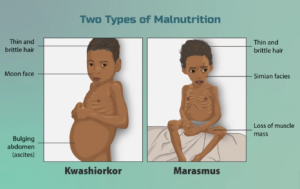In a significant move to combat malnutrition, UN humanitarian aid organisation UNICEF, has handed over 12,400 cartons of Ready-to-Use Therapeutic Foods (RUTF) to Jigawa State Government.
The RUTF is expected to treat 14,000 children with wasting, a condition where a child is too thin for his or her height.
The UN agency made this known in a Press statement.
This initiative, according to the UN agency is funded through the Child Nutrition Fund to reinforce the unwavering commitment of both partners to improving child health in the State.
 “Over the past three years, Jigawa State has shown remarkable leadership in nutrition, health, Water, Sanitation, and Hygiene through consistent fund releases, quality service delivery, and creating a strong enabling environment.
“Over the past three years, Jigawa State has shown remarkable leadership in nutrition, health, Water, Sanitation, and Hygiene through consistent fund releases, quality service delivery, and creating a strong enabling environment.
“The CNF supported by key donors such as the Bill and Melinda Gates Foundation, The Children’s Investment Fund Foundation, and Foreign Commonwealth and Development Office, amongst others, and managed by UNICEF, is a unique funding instrument. Matching government financing of essential nutrition commodities in a 1:1 ratio, it allows governments to double their investment, accelerating the scale-up of policies and programs for the prevention, early detection, and treatment of malnutrition,” the statement partly read.
It noted that Jigawa State was one of the early adopters of the CNF, releasing N250M in 2023.
The agency said it matched this amount, enabling the procurement of 12,400 cartons of RUTF, as this initiative will treat children with severe wasting, marking the largest contribution by any state in Nigeria under the CNF to date.
“UNICEF is our key partner, and we are happy to have seen our partnership becoming even stronger. My government is committed to improving the nutritional status of women and children of Jigawa State as it is a matter of their fundamental rights,” said Mallam Umar Namadi, the Governor of Jigawa State.
UNICEF said malnutrition in Nigeria is on the rise, driven by conflict, forced displacement, and increasing food insecurity due to limited accessibility and affordability.
“Nigeria currently has the highest number of malnourished children in Africa and the second highest globally, with over nine million children wasted. Jigawa State faces a high burden of malnutrition, with 64 per cent of children stunted, 9.6 per cent wasted, and 81.9 per cent suffering from anemia. Over 80 per cent of children experience food poverty, lacking a diverse diet to support growth and development.
“Despite these challenges, Jigawa State has been proactive in dealing with the situation. Last year, the state procured 4,672 cartons of RUTF, (there are 150 sachets per carton of RUTF treating over 5,000 children.
“Jigawa’s innovative Masaki Nutrition Programme, with 300 community sites fully funded by the government, focuses on malnutrition prevention. Trained community health workers are deployed across the state, making Jigawa the first state in Nigeria to implement such a community nutrition programme,” it added.
UNICEF Representative in Nigeria, Ms. Cristian Munduate, expressed her admiration for Jigawa State’s efforts: “The commitment of Jigawa State under the leadership of the Governor in addressing malnutrition has been exemplary. The Child Nutrition Fund has allowed us to double our impact, ensuring that more children receive the life-saving treatment they need. I sincerely hope other state governments will be encouraged by the commitment shown by Jigawa State and invest in the child nutrition fund to address malnutrition in their respective states.”
Ms. Munduate also announced, “UNICEF will provide Multiple Maternal Supplements (MMS) free of cost for pregnant women in Jigawa State to improve pregnancy outcomes. Our commitment to enhancing nutrition and health outcomes for the people of Jigawa, especially women and children, remains steadfast.”
The CNF is a unique match funding instrument in which UNICEF and its partners match government financing of essential nutrition commodities in a ratio of 1:1. This enables states to increase the number of commodities available for the prevention and treatment of acute malnutrition. The CNF helps to contribute to addressing malnutrition by improving access to life-saving nutrition commodities for children and women who need it the most.


